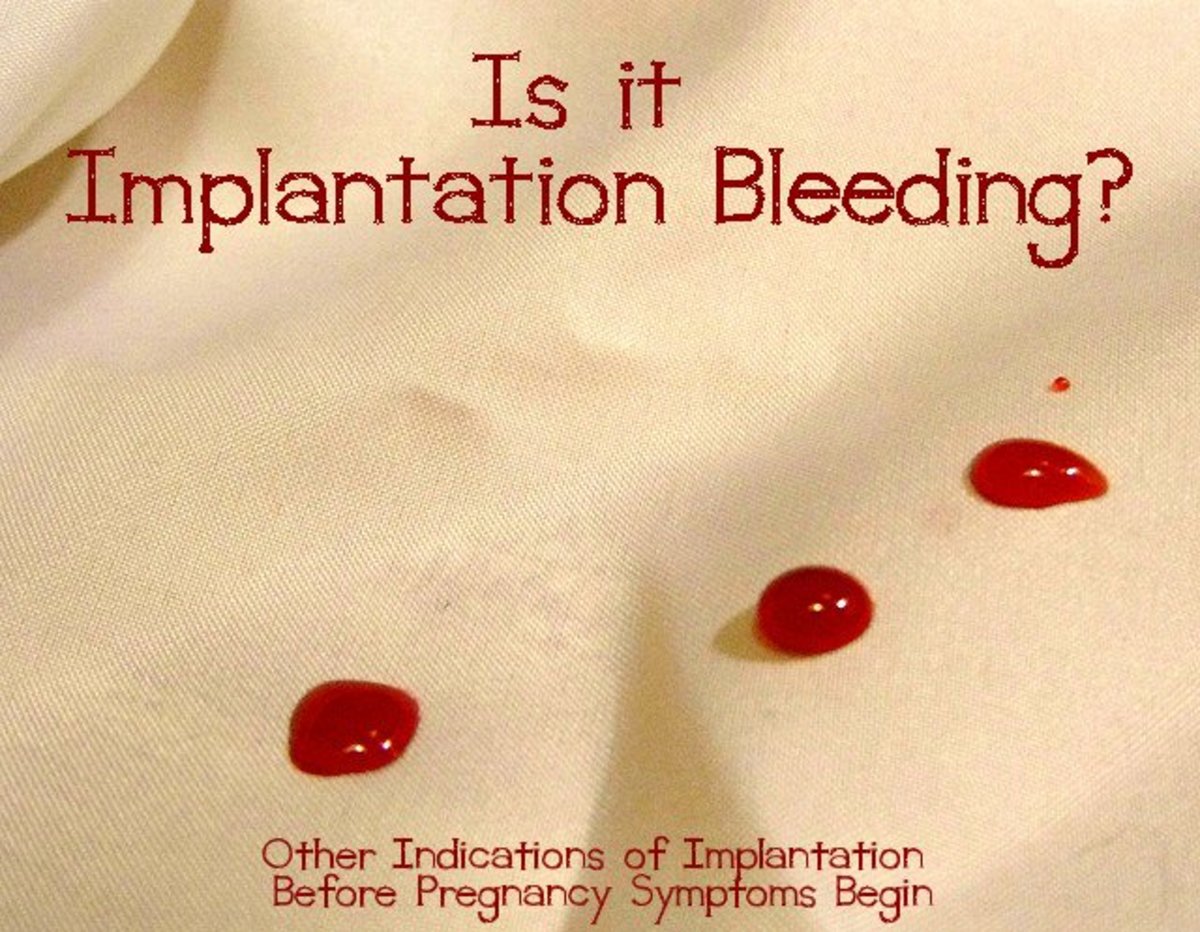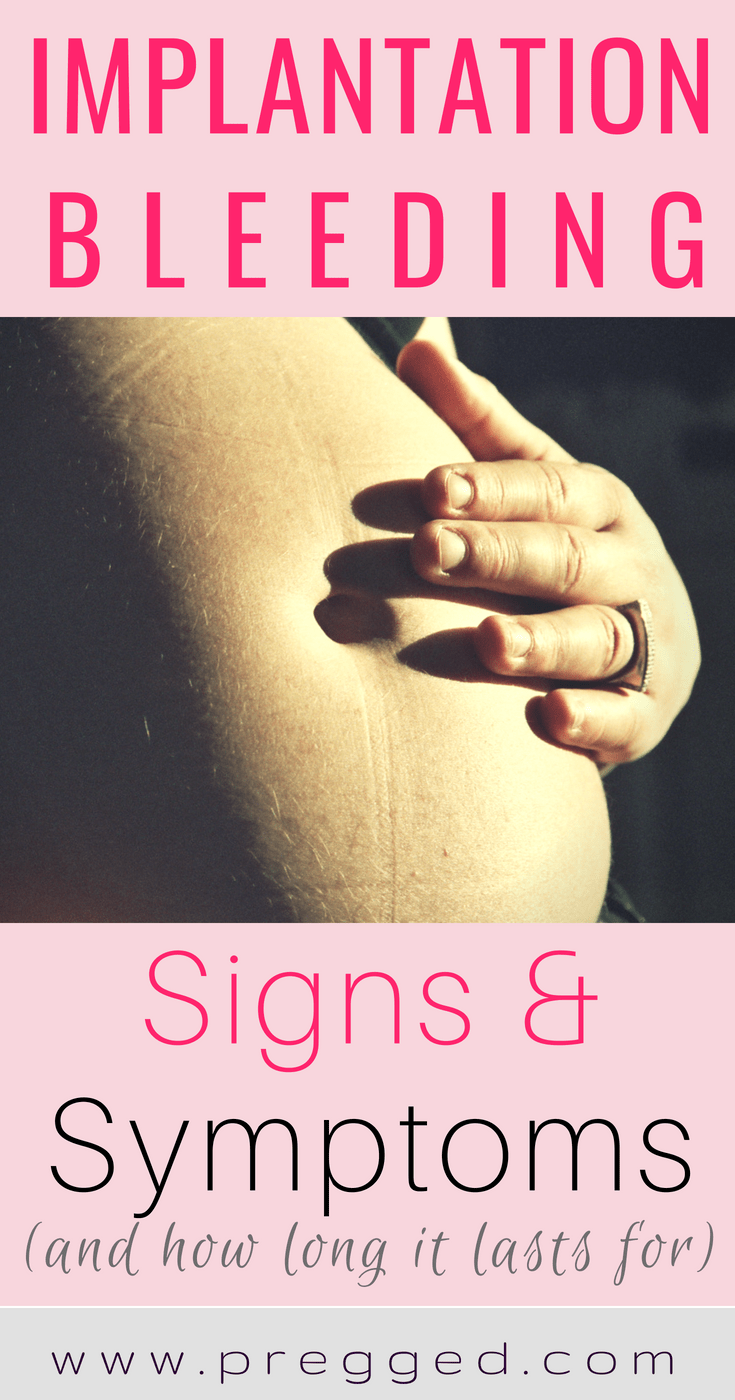How does your basal body temperature change. You can take a test right away if you havent done so before especially since implantation bleeding usually happens around the time youd expect your period.
 Is This Implantation Bleeding And Cramping Before Your Period Is Due Wehavekids Family
Is This Implantation Bleeding And Cramping Before Your Period Is Due Wehavekids Family
If a person notices a.

How long is implantation bleeding. This is because every woman has a different length of menstrual cycle. Implantation bleeding should only be light spotting just a few drops of blood which can last for a few days. When it happens most people dont realize they are pregnant and may mistake implantation bleeding for a period.
When does implantation bleeding occur. So you will notice spotting 5-7 days before your period is expected to start. How Long Does Implantation Bleeding Last.
Any bleeding that happens before or after that window of time is less likely to be implantation bleeding but its not impossible. How long does implantation bleeding last and how heavy is the bleeding. To differentiate implantation spotting from your period lets take a look at some signs and symptoms.
And this is why some women mistaken implantation spotting for their period. It may be caused by a fertilized egg implanting in the blood-rich lining of your uterus. Read more in article.
Implantation bleeding should last only between a couple of hours to three full days. Anything more than two days cannot be implantation related bleeding. How long after implantation bleeding can I take a pregnancy test.
Implantation bleeding does not usually last as long as a womans typical menstrual period. Implantation bleeding longer than two days can be because of tubal pregnancy. Implantation bleeding cannot last for 5 or 7 days its abnormal.
Often this bleeding happens between the 6th and 12th days after the embryo has formed or somewhere between the 2nd and 7th days before period. If the bleeding you are experiencing is bright or dark red blood lasts more than three days and is a full flow in that you are filling up padstampons it it very unlikely you are experiencing implantation bleeding. Period bleeding can last for anything between 3-5 days.
Pregnancy implantation bleeding is a small amount of bleeding or light spotting that occurs about 10 to 14 days after fertilization. Women having their first pregnancy may bleed or spot a little bit more than those who are used to getting pregnant. Implantation bleeding usually takes place 6 to 12 days after conception or 10 days after ovulation.
Implantation bleeding typically occurs between 6 and 12 days after conception when the fertilized egg attaches to the lining of your uterus. During this time the inner lining of the uterus called the endometrium starts to change. Implantation bleeding is a common process during which the embryo attaches to the lining inside the womans uterus.
Implantation is a 48 hours process and so at most implantation bleeding can last two days. Implantation bleeding is light bleeding or spotting that occurs between 7 and 14 days after fertilization. Usually this means that any bleeding will happen within 1 week of the expected date of your next period.
The length of implantation bleeding differs between women but the maximum amount is about three days of spotting. Implantation bleeding typically happens around 6-12 days after you conceive. This is much shorter than a period so if you see blood for a short time and it disappears this is a good sign youre pregnant and experiencing implantation bleeding.
It tends to occur a few days before your period would be due. But for a few women it can also last for 3-5 days. Studies also determined that bleeding begins five days after implantation.
Implantation bleeding lasts for a day. It usually occurs 10-14 days after conception or around the time of your missed period. On average implantation bleeding can last just a few hours or as long as three days.
Implantation bleeding is generally light and short just a few days worth. How Long Does Implantation Bleeding Last. However vaginal bleeding has.
Implantation bleeding usually lasts around 1-2 days but can last anything from a few hours to spotting on and off for many days and be extremely light and stay light. As a rule its duration is limited to a few hours 1-2 days in exceptional cases. For a lot of women bleeding during implantation usually last for 24-48 hours.
Implantation bleeding is light bleeding that may happen about six to 12 days after conception. After ovulation and at the moment an egg is successfully fertilized by a sperm in a fallopian tube the embryo starts dividing and growing.
The most common reason for spotting on birth control especially if you just started taking the pill is just your uterine lining adjusting to the new hormones. Certain birth control pills are known to cause breakthrough bleeding especially the ones that only contain the hormone progestin.
 Abnormal Uterine Bleeding Associated With Hormonal Contraception American Family Physician
Abnormal Uterine Bleeding Associated With Hormonal Contraception American Family Physician
This is not abnormal.

Bleeding while on birth control pill. Women may experience this within the first three to four months after they start the pill as the body takes time to adjust to the new hormones. If you frequently forget to take your pill bleeding may occur. Breakthrough bleeding or unscheduled bleeding while taking birth control is common.
However if this persists for longer than 3 months or if it changes or gets worse in any way please see your GP for an examination and possible investigations. Its all about the balance of estradiol and progestin and how your body metabolizes it- which can vary from woman to woman. Birth control pills contain synthetic hormones estrogen and progesterone in varying amounts to suppress ovulation.
Also if a person forgets to take their birth control pill or takes it at the wrong time hormone levels can change quickly and cause symptoms such as cramping spotting and bleeding. If the normal 28-day birth control pills are taken in a continuous manner it can cause breakthrough bleeding. Breakthrough bleeding is also common when we switch between different types of contraceptives or types of the Pill as the hormone dosage will be different.
And placebo in women who had abnormal uterine bleeding while using contraceptive implants. Breakthrough bleeding anything from light brown discharge up to bleeding like your regular period is the most common side effect for women beginning birth control. When any birth control pill is started there is a chance that breakthrough bleeding also called spotting may occur during the first few months of use.
Breakthrough bleeding is normal and is usually a temporary side effect with birth control use. Additionally if pills are taken inconsistently ie. Spotting after starting a pill is usually mild and resolves in few months.
Bleeding during the pill free break on the combined pill is normal and spotting is a known side effect that all contraceptive pills can cause. Switching from longer cycle pill to a 28-day pill may reduce breakthrough bleeding however actual menstruation will occur more frequently. Spotting will often subside with.
Bleeding while youre consistently taking the Pill is not your period. Most women take birth control pills that contain both progestin and estrogen to prevent or decrease breakthrough bleeding. While this may sound great it seems that breakthrough bleeding occurs more often with this kind of pill and other extended cycle pills than with the 28-day regimen pills.
Breakthrough bleeding is commonly. Breakthrough bleeding on the pill is more commonly seen when the regimen is continuous or extended cycle for eg. If you have breakthrough bleeding while taking birth control pills as prescribed you may experience it one or two weeks before your period and it should follow a consistent pattern.
Breakthrough bleeding typically goes away with time and the second cycle is usually much better than the first but it may take up to 3 full cycles for breakthrough bleeding. The combination OCP was more effective than ethinyl. Birth control pills patches implants injections and rings that contain hormones can cause abnormal vaginal bleeding as a side effect.
Breakthrough bleeding is a common side effect of birth control pills. Its especially common in the first three months of using hormonal birth control. Also taking birth control pills continuously over a long time can cause breakthrough bleeding.
However sometimes bleeding occurs during the active-drug phase of your cycle. This breakthrough bleeding can cause distress and confusion. During the first few months when a woman begins using hormone-based birth control.
It could also happen when you miss a pill or you fall ill have stomach upsets or vomiting and cant keep the pill down. Birth control pills that contain only progestin. During the placebo week of your pills you may bleed because the little endometrial lining you may have is super fragile and sheds with a quick shift of hormones 2.
Breakthrough bleeding occurs as your body adjusts to different hormone levels. However if you persistently have heavy bleeding while on birth control you should inform your doctor ASAP. Because most birth control pills contain 35 mcg or less of estradiol breakthrough bleeding is fairly common.
Many people experience some irregular bleeding or spotting when they first start taking birth control pills. During the first few months of starting on the Pill its common for us to experience spotting or unscheduled bleeding while the body adjusts to hormonal birth control. Birth control pills are a convenient method of contraception for many women.
When birth control causes abnormal vaginal bleeding. Just continue using your birth control as normal and give your body time to adjust to the birth control you are using. If you are taking pills for the first time then it may take about 3 months for your body to adjust to these new synthetic hormones.
Seasonale Seasonique and Quartette as compared to that of a 28-day schedule. During the non-drug or placebo days you experience bleeding which you view as your period. It may also happen after you switch to a.
Breakthrough bleeding while on the pill is also a possibility if you take certain antiseizure medications or herbal remedies such as St. Typically breakthrough bleeding recurs for no longer than a few months after starting a new oral contraceptive and then it stops. Doctors also refer to it as breakthrough bleeding.